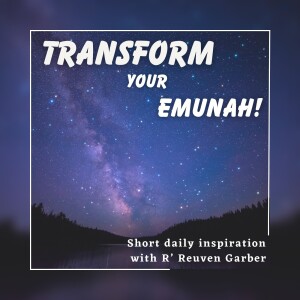
Thursday Jun 12, 2025
357 - Black & White Angels
We've been discussing that one of the highest expressions of Emunah is the performance of Hashem's mitzvos and specifically to perform them just because He commanded me to and not because I understand or agree with His understanding. It is so vital to perform the mitzvos based on our belief in Hashem rather than based on our agreeing with His logic because when we perform the mitzvos based exclusively on our Emunah in Hashem, our belief in Hashem, we will treat every mitzvah with highest priority and do our best to fulfill them with all their intricacies. The Mishnah in Pirkei Avos says that we ought not to treat one mitzvah as less important than another because truthfully, we don't know which are the more important mitzvos. One mitzvah may seem to us like something very potent and big and another mitzvah might seem to us as something very insignificant whereas in truth it might actually be the other way around. How are we supposed to find out? In this world we don't find out. In the next world we will see but in this world, we are just to believe.
If Hashem commanded us to do something even if in our eyes it seems to be insignificant, we nevertheless ought to treat it as if it was the most important mitzvah in the world. And in the same way if the guidelines within a certain mitzvah are very intricate and detailed, at first glance we may think - why are these intricacies so important? Let me just use a bit of my own discretion in the way I perform this mitzvah? Again, if it's based on one's own logic, one might mistakenly be misled down that path. However, if we perform the mitzvos exclusively because we believe in Hashem, whether the intricacies and the logic make sense to us or not is a detail, we perform all the mitzvos as if they are the most important thing in the world as well as treat the intricacies with great seriousness.
One of the classic halachic commentators, the Chayei Adam, records a fascinating episode that sheds light on this issue. He writes that there was a certain tzaddik who passed on from the world and now moved on to the next world where he had to give an accounting for all his actions and he was delighted to see so many what he calls white angels which represent the result of his good deeds, of so many blessings that he made, of so many acts of tzedakah, of so many words of Torah that he learned, of so many acts of kindness and many mitzvos that he performed. And then suddenly he saw some black angels which represent sin and he was quite surprised because he was a tzaddik and he really had a good record from his excursion in this world. So where did these black angels come from? And he was informed that these angels were created as a result of the blessings that he made without concentration. Now we may say, “look at least he made the blessings, that's a mitzvah.” However, on this man's level to say a blessing without concentration had tremendous serious consequences.
If we view the mitzvah of saying blessings just based on our own logic because we have to thank Hashem for the food, so one may argue perhaps that it's not so bad sometimes to not have concentration on our blessings. If we however base our performance of our mitzvos exclusively on how the Torah guides us to do them both in terms of their details as well as the reasoning for the performance of the mitzvah, our approach to the mitzvos would be very different. As mentioned previously, the Chayei Adam also writes that if one says a blessing without concentration it is comparable to a body without a soul. A body without a soul is dead. We all have the opportunity multiple times a day to say blessings. Let us internalize how important it is both to say the blessing as well as to do our best to concentrate on saying the words to mean what we say and of course the more we learn about what the blessings mean the more we'll be able to concentrate and sincerely mean our words that we are saying to Hashem.
No comments yet. Be the first to say something!